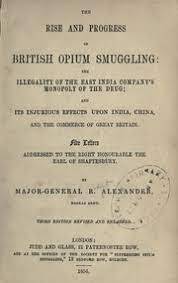The Labor Coverup
Samuel Baildon was a British economist that documented the financial practices of the tea trade after the British East India Company’s nationalization in 1858. This novel goes over almost every financial aspect that running a successful tea either plantation or other parts of industry. By going through step by step costs of labor and industrial necessities we can get a better understanding of why some trade decisions were made and even go as far to justify the decisions the British East India Company made in order to maintain profits for its capitalist system.(Miller) Also labor statistics provide a teller on how these private tea traders treated their workers and general sentiment toward their overlords. (Veevers)
These letters from those against the Opium trade were compiled by Alexander in this novel to show one side of the sentiment. However, these letters were written late in the overall life of the opium trade by the British East India Company and come off seemingly from a perspective of guilt, seeing what the cultivation and mass trade of the drug has done to the Chinese population all the while exploiting Indian workers. (Miller)This is the first account of opium also being used by Europeans and their experience with it gives much insight into the side effects, while those who are against it say using it is un-christian, especially being used in the production.(Anderson) The final plea is to return order to the trade and bring back a sense of law to India regarding opium. This perspective is contrary to most others I have researched and for that reason not widely reproduced as it paints the British East India Company trade as negative to the environment and people and in the end this plea was never really taken seriously as post nationalization the opium trade continued under the British government. (Rose)(Miller)


